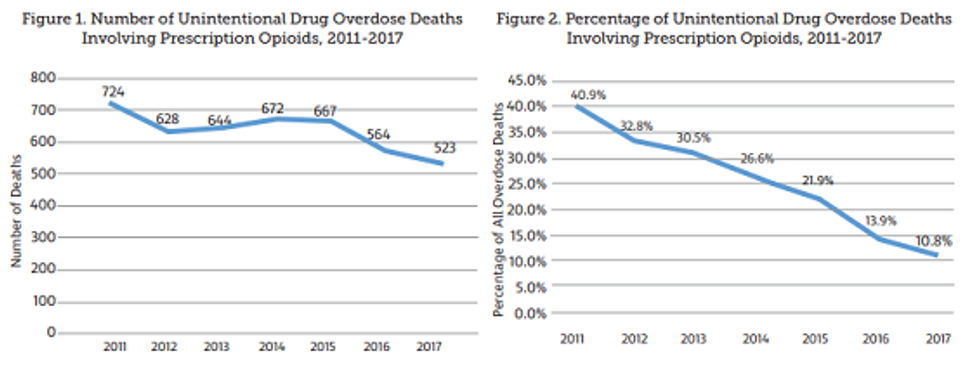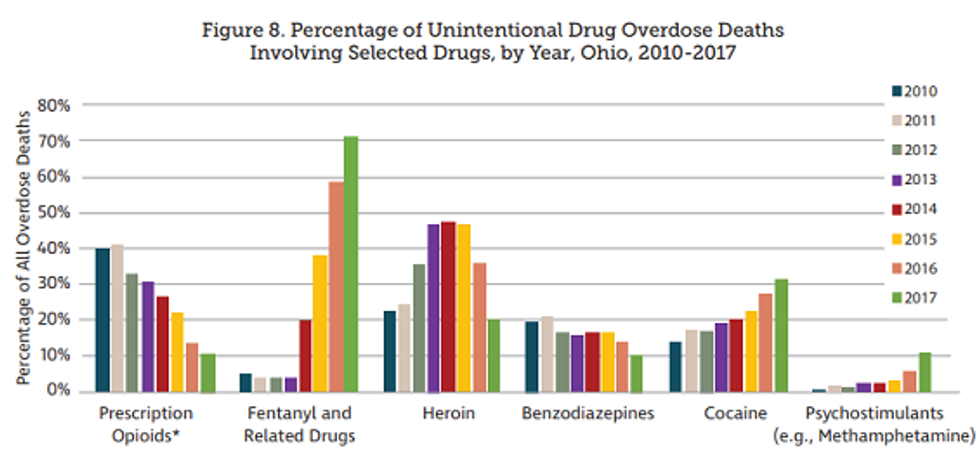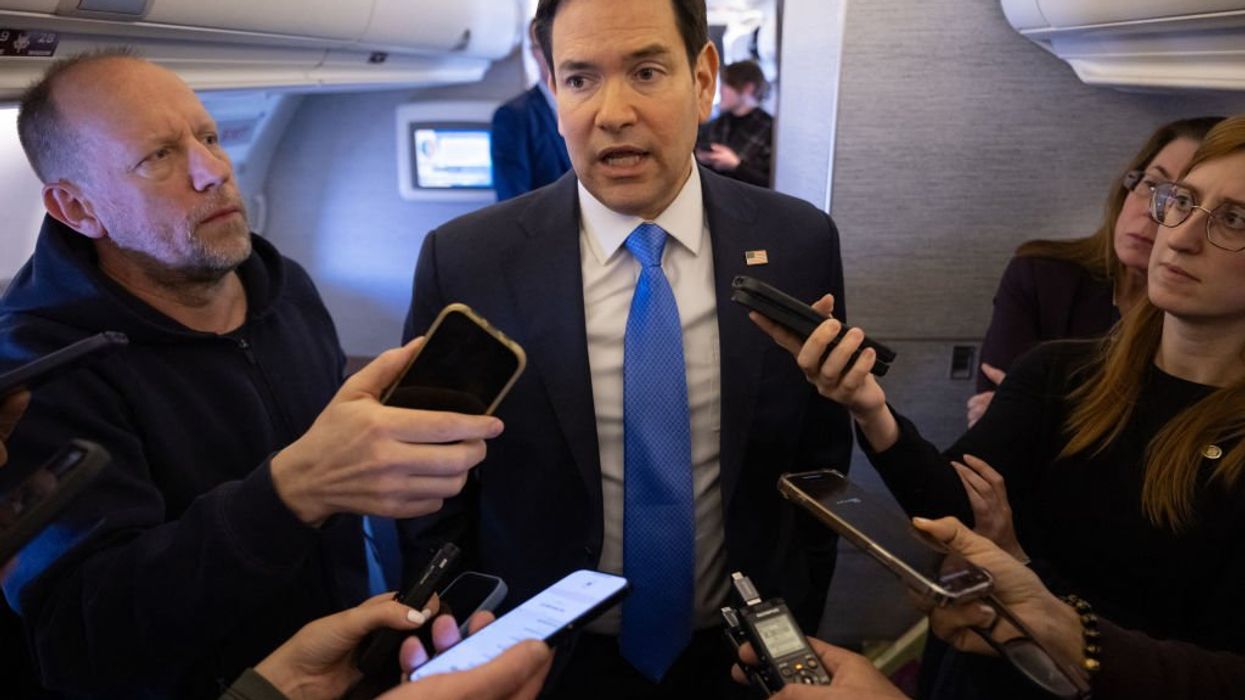
© 2025 Blaze Media LLC. All rights reserved.
Ohio’s drug crisis is caused by Mexican cartels, NOT prescription drugs
October 11, 2019
There are endless lawsuits in Ohio against pharmaceutical companies over the drug crisis, but to get the real culprit, it’s time to sue the government for not enforcing immigration laws. The drug crisis is all about the Mexican drug cartels and their criminal alien distribution networks in our country, not prescription opioids.
In 2017, 4,854 died in the Buckeye State from unintentional drug overdoses, more than any other year on record. Of those deaths, just 10.8 percent were from prescription drugs, according to the Ohio Department of Health. And there’s good reason to believe that some of those deaths are really the result of heroin too. According to the Centers for Disease Control (CDC), many of the deaths due to morphine are likely really heroin deaths but recorded as morphine in toxicology “because morphine is a metabolite of heroin.”
In fact, the number of prescription deaths actually decreased before the crisis even began. The entirety of the epidemic increase beginning around 2014 was due to fentanyl and, to a lesser extent, meth and cocaine. Here are two charts from the Ohio Department of Health’s 2017 overdose data that are worth more than 1,000 words.
So, what is causing the deaths? It’s all the Mexican drug cartels and their illicit drug distribution networks, often powered by illegal aliens. Recently, there have been several busts in the Toledo area. In the third major bust in northwest Ohio, federal drug cops arrested Robert Escobar for intent to traffic 21 pounds of fentanyl. That might not sound like a lot, but given that a lethal dose of fentanyl is about two milligrams, this stash was enough to kill well over four million people, or more than a third of the state’s population.
U.S. Attorney Justin Herdman, as quoted in the Toledo Blade, perfectly captures the trail of the drug crisis.
“Mexican cartel activity in Ohio is very high — it’s a significant threat to us across the whole state. It’s not just Toledo, it’s every midsized city, small town, and big city — every city has connections back to Mexican cartels,” Mr. Herdman said, adding Toledo has historically been a market because of its network of highways, along with its consumer demand.“That’s where our drugs are coming from. They’re not being manufactured here in the United States, the way that they get here is through the networks that the cartels run.”
Reading this comment, I was reminded of what Robert Murphy, special agent in charge of the DEA’s Atlanta office, told me earlier this year. “The product doesn’t sell itself or produce itself. It’s the people who make the cartel run, collect the cash, do the distribution, engage in violence, and run operations for the cartel. Those are what’s essential. The product is an after-fact. Without the people, the cartels have no success.”
Who are these people? “Predominantly, what we arrest here is illegal aliens. Sure, you might find some Americans who would be willing to go to Mexico and work for the cartels, but it won’t be the level that they need to have the control of the U.S. market like they do now with the illegals and Mexican nationals.”
During the major bust on “Devil’s Highway” in Lawrence, Massachusetts, two weeks ago, 40 individuals were arrested for drug trafficking in the major pipeline fueling the entire crisis in New England. According to former DEA special operations division head Derek Maltz, “The majority of the people arrested” in that bust were illegal aliens.
So where is the urgency to enforce immigration law and clamp down on sanctuary cities that release illegal alien drug traffickers when they are caught?
Maltz, in an interview with CR, lamented that the federal government won’t even take action to designate the Mexican cartels as terrorists. “In order for the U.S. to achieve its stated objective and dismantle the drug cartels, we must come to the realization that Mexican drug cartels are not solely organized crime organizations but instead are terrorist organizations who pose a national security threat and who have attacked and destroyed a democratic society directly across our southern borders.”
Earlier this year, the Ohio House passed a resolution asking the federal government to designate the cartels as terrorists. Maltz testified at the hearing on the resolution.
Ohio has already taken a hatchet to prescription opioids, and it is harming legitimate pain patients. Prescriptions have plummeted by 28 percent from 2012 to 2017. How about taking a hatchet to criminal alien networks? In our litigious society, it seems that nothing is off-limits to lawfare except illegal immigration.
#mc_embed_signup{background:#fff; clear:left; font:14px;}
/* Add your own MailChimp form style overrides in your site stylesheet or in this style block.
We recommend moving this block and the preceding CSS link to the HEAD of your HTML file. */
Want to leave a tip?
We answer to you. Help keep our content free of advertisers and big tech censorship by leaving a tip today.
Want to join the conversation?
Already a subscriber?
Blaze Podcast Host
Daniel Horowitz is the host of “Conservative Review with Daniel Horowitz” and a senior editor for Blaze News.
RMConservative
Daniel Horowitz
Blaze Podcast Host
Daniel Horowitz is the host of “Conservative Review with Daniel Horowitz” and a senior editor for Blaze News.
@RMConservative →more stories
Sign up for the Blaze newsletter
By signing up, you agree to our Privacy Policy and Terms of Use, and agree to receive content that may sometimes include advertisements. You may opt out at any time.
© 2025 Blaze Media LLC. All rights reserved.
Get the stories that matter most delivered directly to your inbox.
By signing up, you agree to our Privacy Policy and Terms of Use, and agree to receive content that may sometimes include advertisements. You may opt out at any time.





